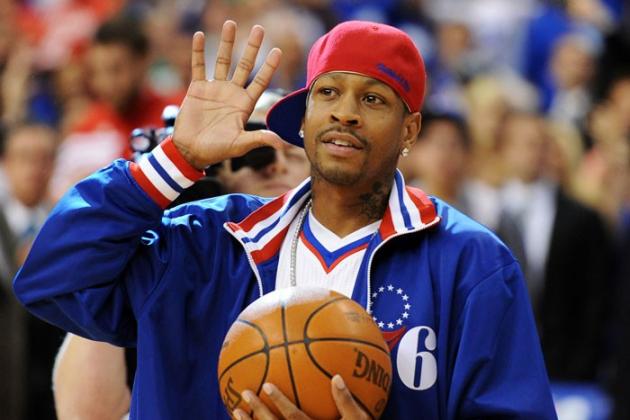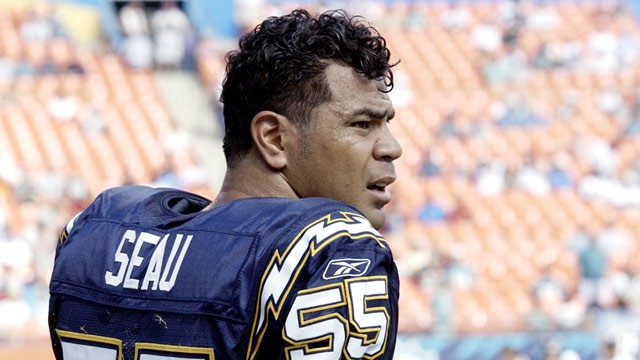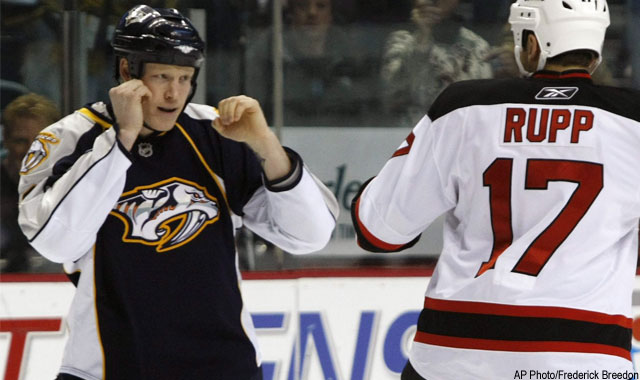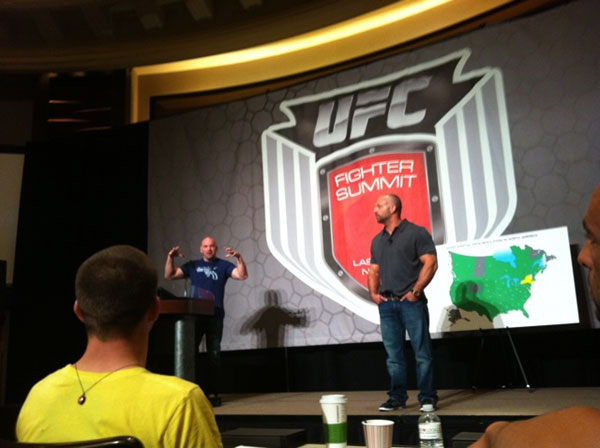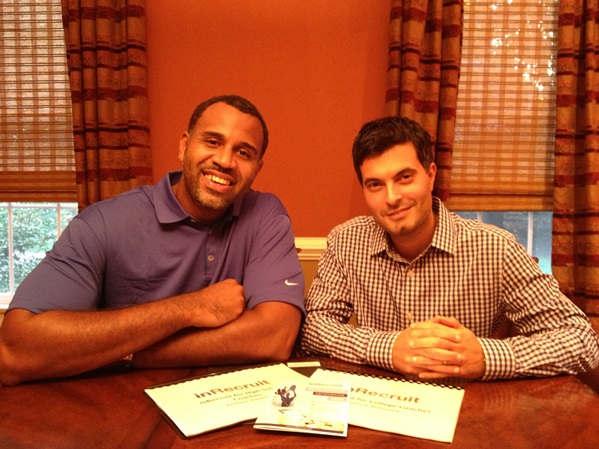
Professional athletes like Malik Allen remind us that success at the highest level of athletics can be defined by something other than championships, enormous salaries, and lucrative corporate sponsorships. After playing four years of Big East basketball at Villanova and making the NCAA Men’s Basketball Tournament twice, Allen entered the NBA in 2000 as an undrafted free agent. The dedicated and determined Allen was able to spend 10 years at the highest level of his profession – more than twice as long as the average professional in his sport.
Allen was not one of those guys one would assume would make it at the pro level. But he persevered and pushed through a career in the pros that was filled with the uncertainty that comes with short contracts and frequent trades. Starts were rare, stat sheets arguably less than stellar, and the windfall checks and seven-figure shoe deals elusive. He was a role player and he understood his role perfectly. His own measured assessment of his playing days is neither modest nor self-deprecating. He understands there aren’t legions of kids out there putting themselves to sleep at night with dreams of being like Malik, just like he understands that anyone with professional hoop aspirations would be lucky to achieve a fraction of what he has. Allen worked hard to earn every minute of the decade he spent in the NBA, and he is proud of what he accomplished and grateful for the opportunity.
NOW RETIRED from the game, Malik Allen has co-founded a company called inRecruit, an online recruiting community for players, parents, coaches, fans, and sportswriters. inRecruit is a place where players can build profiles advertising themselves and search out schools and coaches they’re interested in. Coaches meanwhile, can track the development of players, as can sportswriters and fans. And Allen, along with co-founder and former Villanova classmate, Joe Rocco, is behind it all.
A few innovative features have received some early attention, like the software that automatically updates online news mentions of a player or team, or the one that tracks who has been looking at your profile. But inRecruit brings to the table mostly the same things any social media site does: access. Everything is all in one place with available search options that make connecting with people simple. As such, it is the Malik Allens of the world who stand to benefit.
“Athletics for many people is an opportunity,” said Malik Allen. “And that’s what we’re trying to offer: an opportunity for coaches to take notice of kids they never possibly could have in the past, an opportunity for players to learn about schools they maybe didn’t even know existed.
“When you look at the recruiting landscape, there’s so much guessing that goes on. No one really knows what’s out there and what to make of the information they have. At the end of the day, inRecruit is about cutting through the noise.”
inRecruit is not for Division I coaches with scouting budgets or blue chip high school seniors with a jump shot. It is really for the small town varsity starter who, like Allen, isn’t ready to call it quits after high school, but doesn’t know where to turn. It is for the Division III coach who can’t offer a scholarship but needs a well-rounded player who will fit the team.
“InRecruit fills a void in recruiting,” said Joe Rocco. “An information void. People can’t be everywhere. Most people don’t have the time or money. And exposure is tough to come by. We wanted to create a space where people who wouldn’t otherwise can come together.”
JOE ROCCO AND MALIK ALLEN met during their freshman year at Villanova. And from the beginning, says Rocco, Allen impressed him as “A very focused person.” One who Rocco describes as “grounded and humble.”
“He (Malik) worked extremely hard at basketball, because that was his ‘business’ at the time,” Rocco said. “But he was always aware that the odds were against him, that he needed to be ready in case it didn’t work out.”
According to Rocco, Allen carried that same level of self-awareness with him throughout his professional career. “Especially when he knew it was winding down,” said Rocco. “He would talk a lot about what he was going to do afterward. He always knew that basketball wasn’t forever, and I think it lasted for him a lot longer than he expected it to. But when it did come time to retire, [the next step] was something he had been mindful of for years.”
Shortly after his retirement, Allen connected with Rocco to discuss business ideas. Allen, says Rocco, a practicing corporate real estate attorney, was the driving force behind it. The two decided to build a business that focused on modernizing sports recruiting. Convinced this was the right direction, Rocco said the two didn’t even discuss anything else. "I was grabbed by it immediately,” Rocco said, “and Malik’s passion really got things moving. From there, we just went about trying to figure out how to make it a real thing.”
“Joe was sending me a lot of research and general background information on the tech world and running a startup,” Allen said. “I found and still find a lot of the information out there to be fascinating, but it was so different from what I had been doing. I hadn’t been reading like that since I graduated, and totally new stuff, too. But I had that hole in my life where my old routine had been, and I was happy filling it in with anything. After a while, it gets to be second nature. You get up, and you know you have to work. You can’t go to sleep at night unless you know you’ve put in the hours and done what you’re supposed to.
“The idea had always excited me, but there’s no such thing as a smooth transition from basketball. It wasn’t until I started really diving into the reading that I realized how passionate I was about it, and that was when I think it actually clicked that 'hey this is something I can really devote myself to,'” he concluded.
Allen’s contacts in the sports world played a crucial role during the development stages. “He knew lots of people from his playing days: coaches, directors,” Rocco said. “They all had a lot of respect for him just because of the way he carried himself along with the fact he had stayed in touch with a lot of them – that’s just how he is. They were happy to talk to us and gave us some great feedback. And from there we just tried to gather input from as many people as possible. Players, obviously, coaches, even journalists and admissions officers.”
Rocco had prior experience working with startups, so he started sending Allen reading material to bring him up to speed on the process and all the considerations that go into it. Before long, though, it was Allen sending him the research, and Rocco was the one struggling to keep up.
“I couldn’t believe he was reading so much,” Rocco recalled. “I had my regular job, but new stuff would be coming in every day. It got to be too much. After a while, I just told him, ‘do your thing,’ and kind of let him take over.”
PROFESSIONAL SPORT doesn’t seem like the endgame it is usually made out to be. When I spoke with Allen, he told me “there’s no such thing as a smooth transition [out of the pro life].” And that’s easy enough to understand. How do you move on from the reality of having fulfilled, what has been up until that point, your lifelong dream?
Life in general is difficult and not just for transitioning athletes. Allen’s experience gives credence to the sometimes-contrived notion that sports can prepare you for it. In Allen’s case, the professional life was the transition. Specifically, it was training for the exhaustive, maddening labor of developing and launching a startup company. But that’s just how things happened to play out. With Allen, you get the sense that sports would have inevitably dictated whatever he chose to pursue afterward. And a large part of the success of his rising business entity, inRecruit, can be attributed to that.
“People don’t see all the work that goes into it,” Allen said. “All of the effort, all of the sacrifices, all of the little decisions and choices […] more so for guys like me. I wasn’t a great player but I was professional.
“That’s what made it meaningful for me,” Allen continued. “Knowing that I had been there in the gym, in the tape room, and active in the locker room, and that I was getting to live my dream because of it. You just have to be so grateful for the opportunity to prove yourself on that level, and grateful for when people see all that extra stuff and acknowledge you for it.”
IT’S HARD TO AVOID THE CONCLUSION that Allen fell into the perfect range of success as an athlete. Had he been more naturally talented, he may never have cultivated the love of labor that underlay his professional career and that has since gone on to power his entrepreneurial ambitions. Had he not possessed whatever combination of ability and physical attributes that allowed him to compete at the level he did for so many years, the utility of putting so much time and effort into basketball would have been rendered null.
Allen’s work ethic is impeccable and for Allen, working has become “a compulsion.” With inRecruit, he has found something that rewards the energy he pours into it, something that makes him want to work. But if it hadn’t been inRecruit, it would have been something else. And yes, it’s fair to say that he has sports to thank for that.
Allen discounts completely the notion that the Kobe Bryants of the world do not also hone their craft over hours and hours of grueling work. But Kobe Bryant works to be the best basketball player ever, whereas Allen worked because he understood that his very future in the sport was dependent on it. The balance of success and hardship that was Allen’s playing career was better – more stable – in the long run than gaudy success could have been, even if it perhaps didn’t feel like it at the time.
The tenuousness of his career in the NBA forced him to be “highly conscious” of money and plan ahead for the inevitable day when people were no longer giving it to him in exchange for playing a game. And the characteristics that helped him survive longer than his stat sheet are now being put to use in his post-career.
“I was lucky, in that the things I learned in basketball apply directly to running a startup,” Allen said. “Most of all, what I learned was resilience. Basketball was never easy for me, and that resilience is the most important thing with a startup.”
Indeed, for most people, the startup world takes a level of willful stubbornness that surpasses even that of athletes who have managed to make it pro. Failure is almost guaranteed at some point. But with any luck, Allen won’t experience too much of it.
Wesley Mallette assisted in editing this story.

